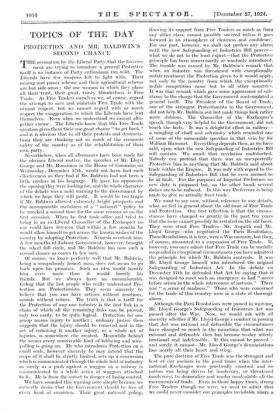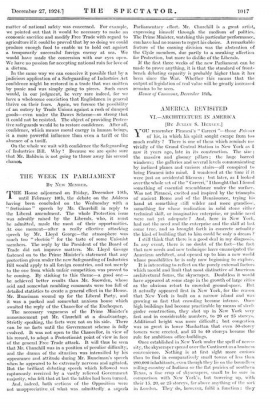TOPICS OF THE DAY
PROTECTION AND MR. -BALDWIN'S SECOND CHANCE
THE accusation by the Liberal Party.that the Govern- ment are trying. to introduce a general Protective tariff is an instance of Party enthusiasm run wild. The Liberals have few weapons left to fight with. Their mining and power scheme and their agricultural scheme are but side-anus ; the one weapon in which they place all their trust, their great, trusty blunderbuss, is Free Trade. As Free Traders ourselves we, of course, regard the attempt to save and maintain Free Trade with the utmost respect, but -we cannot regard with so much respect the exaggeration to which the Liberals have lent themselves. Even when we understand we cannot alto- gether excuse. -The Liberals know that this Free Trade question gives them their one great chance " to get back," and it is obvious that in all their protests and denuncia- tions they are thinking not so much of the economic safety of the country as of the rehabilitation -of their own party.
Nevertheless, when all allowances have been made for the obvious Liberal motive, the speeches of Mr. Lloyd George and Mr. Runciman in the House of Commons on Wednesday, December 17th, would not have had such effectiveness as they had if Mr. Baldwin had not been a little careless in his language. He gave his opponents the opening they were looking for, and the whole character of the debate was a mild warning to the Government by which we hope they will profit. It would be too tragic if Mr. Baldwin allowed extremely bright prospects and the incomparable usefulness of a " national " policy to be wrecked a second time for the same reasons as on the first occasion. When he first took office and tried to bring in an ex-Liberal Chancellor of the Exchequer no one could have foreseen that within a few months he would allow himself to get across the known wishes of the country by adopting Protection. Nemesis overtook him. A few months of Labour Government, however, brought the wheel full circle, and Mr. Baldwin has now such a second chance as- comes to few men.
Of course, we know perfectly well that Mr. Baldwin, being a scrupulously honest man, does not mean to go back upon his promises. Such an idea would horrify him even more than it would horrify his friends. But we always have an uncomfortable feeling that the last people who really understand Pro- tection are Protectionists. They seem sincerely to believe that you can have actions without reactions, sounds without echoes. The truth is that a tariff for the Protection of any one industry is the first link in a chain of which all the remaining links can be proved, only too easily, to be quite logical. Protection for one group means injury to another ; ordinary justice then suggests that the injury should be removed and in the act of removing it another injury, or a whole set of injuries, is somewhere else created. Meanwhile behind the scenes every conceivable kind of lobbying and wire- pulling is going on. He who introduces Protection on a small scale, however sincerely he may intend that the scope of it shall be strictly limited, sets up a concussion which is communicated through the whole field of industry as surely as a push against a waggon on a railway is communicated to a whole series of waggons attached to it. He is from the outset in danger of losing control.
We have sounded this warning note simply because we earnestly desire that the' Government should be free of every kind of suspicion. Their great national policy. drawing its support *Om Free Traders as much as Mon any other class, cannot possibly succeed unless it goes forward in an atmosphere of clearness and confidence.
For our part, however, - we shall not profess alarm until the new Safeguarding of Industries Bill proves— what we do not in the least expect—that the Protective principle has been unnecessarily or wantonly introduced. The trouble was caused. by. Mr. 'Baldwin's ,remark- that when an industry was threatened with -.exceptionally unfair treatment the Protection given to it would: apply, not only to the country from 'which the exceptionally unfair competition came but to all other countries. It was that remark which gave some appearance of sub- stance to the charge that the Government contemplated a general tariff. The President of the Board of Trade, one -of the strongest Protectionists in the GovernMent, did not help Mr. Baldwin out but made things look rather more dubious. The Chancellor of the Exchequer's speech, though- very helpful to the Government, ..did not touch the facts. It was a delightful effort in raillery— a mingling of chaff and solemnity which reminded one of some of the memorable speeches in that vein by Sir William Harcourt. Everything depends then, as.We lave said, upon what the new Safeguarding of Industries Bill will contain. We await that revelation undisturbed. Nobody can pretend that there was an unexpectedly Protective bias in anything that Mr.-Baldwin said about trade within the Empire. It was only with regard to the Safeguarding of Industries Bill that he even .seemed to be at fault. For the purposes of Imperial Preference no new duty is proposed but, on the. other hand, . several duties are to be reduced. In this way Preference is being made to give us actually freer trade.
We want to say now, without reference to any details, what we feel in general about the old issue of Free Trade and Protection. Our first reflection is that the circum- stances have changed so greatly in the past ten years that the issue cannot possibly be restated on the old basis. They were stout Free Traders—Mr. Asquith and Mr. Lloyd George—who negotiated the Paris Resolutions. Those Resolutions, it is true, were a War measure, but they, of course, amounted to a suspension of Free Trade. If, however, you once admit that Free Trade can be usefully suspended in exceptional circumstances you have admitted the principle for which Mr. Baldwin contends. It was Mr. Lloyd George himself who introduced the original Safeguarding of - Industries Act. In the debate on December 17th he defended that Act by saying that it was designed to meet such an emergency as had " never before arisen in the whole intercourse of nations." There was " a sense- of madness." Those who were concerned for the trade of this country were in a state of thorougi alarm.
Although the Paris Resolutions were passed in wartime, Mr. Lloyd George's' Safeguarding of - Industries Act was passed after the War. Now, we would ask with all sincerity whether if Mr. Lloyd George's conduct in passing that Act was rational and defensible the circumstances have changed so much in the meantime that what was rational and defensible then has become to-day utterly irrational and indefensible. If this cannot be proved— and surely it cannot—Mr. Lloyd George's -denunciations lose nearly all their heart and sting.
The pure doctrine of Free Trade was the strongest and bast of our anchors in the good times when the inter- national Exchanges were practically constant and no nation was being driven by insolvency, or threatened insolvency, to demoralie and render incalculable all the movements of trade. Even in those happy times, strong Free Traders though we were, we used to admit that we could never consider our_principles inviolable where a• matter of national safety was concerned. For example, we pointed out that it would be necessary to make an economic sacrifice and modify Free Trade with regard to agriculture if it could be proved that by so doing we could produce enough food to enable us to hold out against a temporarily successful • foreign enemy at sea. We would have made the concession with our eyes open. We have no passion for accepting national ruin for love of a dictum.
In the-same way we can conceive it possible that by a judicious application of a Safeguarding of Industries Act confidence might be restored in a trade that was smitten by panic and was simply going to pieces. Such cases would, in our judgment, be very rare indeed, for we have a wholesome conviction that Englishmen in general thrive on their fears. Again, we foresee the possibility of an outcry by Trade Unions against a rush of dumped goods—even under the Dawes Scheme—so strong that it could not be resisted. The object of providing Protec- tive safeguards would be to restore confidence. After all, confidence, which means moral energy in human beings, is a more powerful influence than even a tariff or the absence of a tariff.
. On the whole we wait with confidence the Safeguarding of Industries Bill. Why ? Because we are quite sure that Mr. Bald-Win is not going to throw away his second chance.



























 Previous page
Previous page